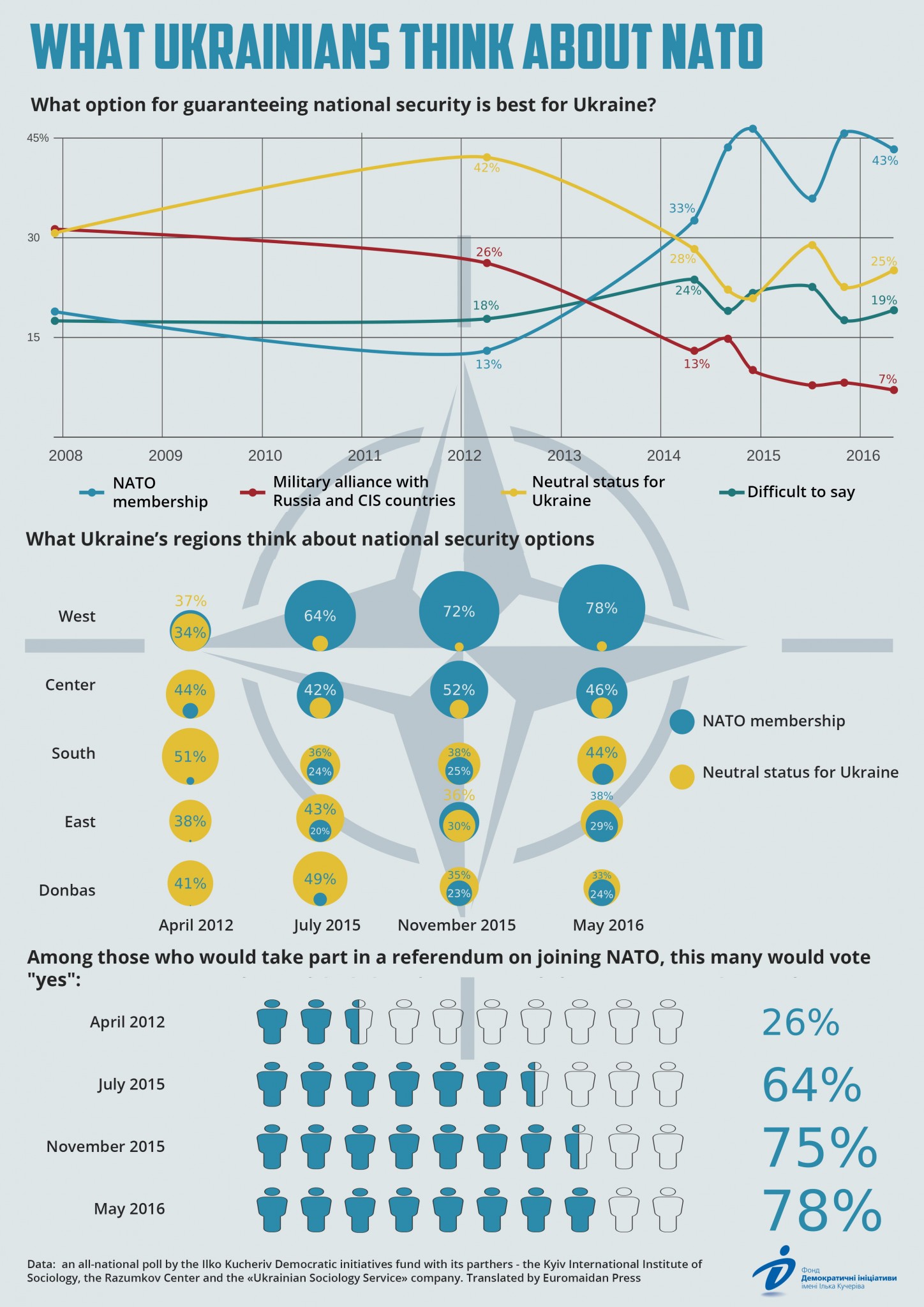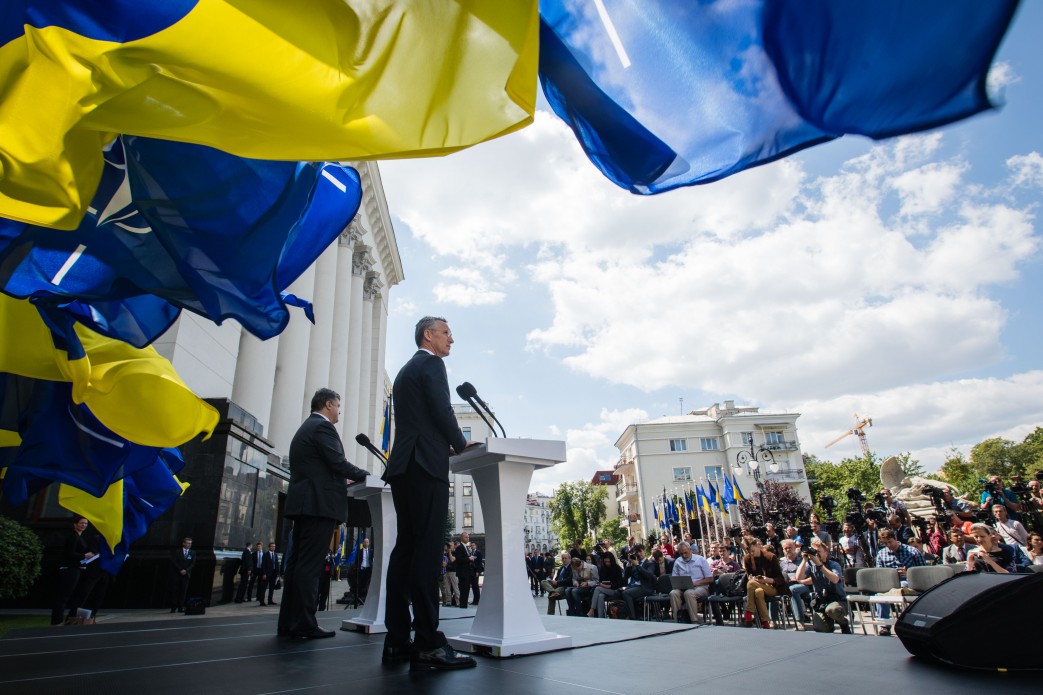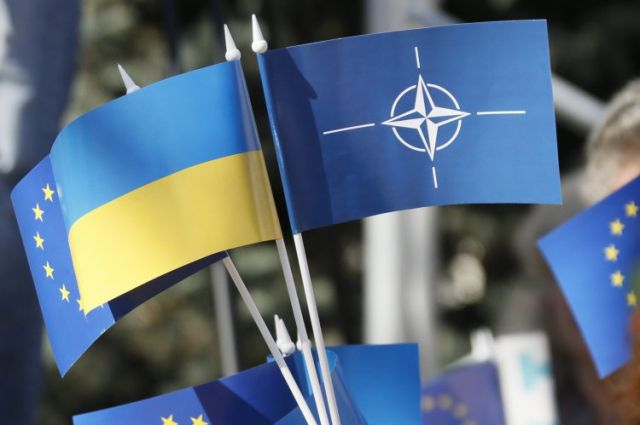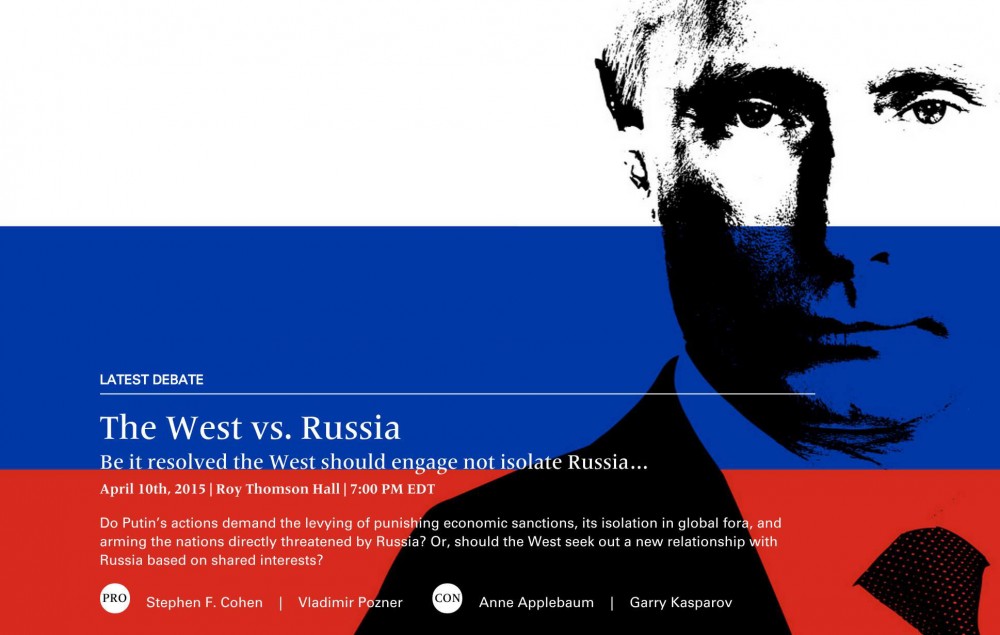Ukraine is now an official NATO aspiring member, i.e. nation declaring aspirations to become full-fledged members of NATO. It was added to the list of such countries on NATO's website on 10 March 2018.
"Currently, four partner countries have declared their aspirations to NATO membership: Bosnia and Herzegovina, Georgia, the former Yugoslav Republic of Macedonia and Ukraine."
Although NATO had expressed its support for Ukraine's Euroatlantic aspirations back on 7 November 2017, it was not given any official status. Then, Secretary-General Stoltenberg did not answer the question whether Ukraine is included on the list of so-called “aspiring nations" which then included only Macedonia, Bosnia and Herzegovina, and Georgia, and stressed that reforms are a priority for NATO-Ukrainian cooperation. Up till yesterday, NATO's site stated that "since 2010, Ukraine has not been formally pursuing membership."
This has now changed, after a working visit of the Ukrainian delegation to Brussels.

Ukraine is now on the list of aspiring countries. As well, the section on NATO-Ukraine relations was updated: it now includes a reference to a bill adopted by the Ukrainian parliament on 8 June 2017 which set NATO membership as Ukraine's foreign policy objective.
Commenting on NATO's decision to recognize Ukraine's aspirant member status, Ukrainian Deputy Prime Minister for Euroatlantic Integration Ivanna Klympush Tsintsadze said:
"There's a long path between recognizing ambitions and membership. It consists of, first of all, internal work, but we can sucessfully walk this path if we will purposefully change the country according to NATO's democratic, social, economic, political, and of course, military principles and approaches."
Ukraine's President Petro Poroshenko has named Ukraine's next ambition - a membership action plan, NATO's programme of advice, assistance and practical support tailored to the individual needs of countries wishing to join the Alliance. Currently, Bosnia and Herzegovina and Macedonia have such a plan.
Meanwhile, a forum titled "Revive the Euro-Atlantic Integration Process" is being held in Brussels with the participation of Ivanna Klympush-Tsintsadze, Special Representative of the USA for Ukraine Kurt Volker, Georgian President Giorgi Margvelashvili, and Deputy Director-General for Neighbourhood Policy and Enlargement Negotiations at the European Commission Katarina Mathernova.
A long and complicated history of relations with NATO
Ukraine became the first CIS country to enter NATO’s Partnership for Peace program in February 1994, and official cooperation began one year later. In 1997, the first official NATO Information and Documentation Center opened in Kyiv and a NATO-Ukraine Commission was established.
But in 2002, Ukraine-NATO relations soured as leaked tapes appeared to reveal that Ukrainian President Leonid Kuchma, apart from ordering to kidnap the Ukrainian journalist Georgiy Gongadze, arranged the transfer of the sophisticated Ukrainian Kolchuga system to Iraq. The scandal unfolded amid a political crisis and protests against Kuchma’s authoritarian rule in Ukraine. The Ukraine-NATO Action Plan adopted in 2002, as well as Kuchma’s declaration that Ukraine wanted to join NATO, and the sending of Ukrainian troops to Iraq in 2003 could not mend relations.
Nevertheless, in 2003 the Ukrainian Parliament adopted a law “The foundations of national security,” in which NATO integration and NATO membership were – much like in today’s law – proclaimed a key goal of foreign policy. The initiative didn’t live long: as soon as Poland became an EU member state, it appealed to Brussels insisting that the Union offers Ukraine membership prospects, which the European Commission declined with a mere partnership offer. The irritated Kuchma ordered to cross out NATO membership from the list of Ukraine’s strategic goals in 2004.
After the Orange Revolution in 2004 in which Kuchma was replaced by Viktor Yushchenko, expectations were high for a pro-EU and pro-NATO course. But internal quibbles and an absence of unilateral support for NATO within Ukraine’s population hampered the plans: in 2008, the second Yulia Tymoshenko cabinet’s proposal for Ukraine to join NATO’s Membership Action Plan was met with internal opposition, and despite US and Polish support at the 2008 Bucharest summit, the Membership Action Plans for Ukraine and Georgia were not approved, having faced opposition by France, Germany, and Italy. However, a declaration was adopted stating that the “future of both countries [Ukraine and Georgia – ed] was connected with the Alliance.”
After Viktor Yanukovych came to power in 2010, Ukraine’s NATO aspirations were curbed as a bill was passed that excluded the goal of “integration into Euro-Atlantic security and NATO membership” from the country’s national security strategy. The law precluded Ukraine’s membership of any military bloc but allowed for co-operation with alliances such as NATO.
In December 2014, 10 months after Yanukovych fled following the Euromaidan revolution, after which Russia occupied Crimea and orchestrated a war in eastern Ukraine, Ukraine renounced this non-aligned status. The step was condemned by Russia. President Poroshenko vowed to hold a referendum on joining NATO, and Ukraine signaled it hopes for a major non-NATO ally status within the United States. In 2017, the Ukrainian parliament adopted a bill restoring the country's course towards NATO membership.
Starting from 2015, military exercises took place between NATO members and Ukraine, including Operation Fearless Guardian, Exercise Sea Breeze, Saber Guardian/Rapid Trident, and Safe Skies. In September 2015, NATO launched five trust funds for €5.4 million for the Ukrainian army. In March 2016, President of the European Commission Jean-Claude Juncker stated that it would take at least 20-25 years for Ukraine to join the EU and NATO.
Public support for NATO membership
The support of Ukrainians for joining NATO soared following Russian aggression against the country which started after Euromaidan. According to polls by the Ilko Kucheriv Democratic Initiatives Fund, until February 2014, it hovered around 15% and most Ukrainians were in favor of a non-aligned status for Ukraine, after which it soared to 33% and is now at its historic maximum, and support for a military alliance with Russia is at a historic low. Ukraine’s NATO membership has the most supporters in Ukraine’s western regions, while the South, East, and Donbas are more in favor of a neutral status. If a referendum on joining NATO would be held, 69% of those who would vote would choose “yes,” according to the latest poll of this fund from July 2017 (not shown on graphic).
Below is a graphic by the Ilko Kucheriv Democratic Initiatives Fund, translated by Euromaidan Press (full size here).

Russian opposition
Russia’s press secretary Dmitry Peskov has already responded to Ukraine’s decision towards NATO integration, stating that Moscow traditionally views NATO expansion towards Russian borders with distrust and concern. “We believe that this threatens our safety and the balance of power in the Eurasian region. Of course, the Russian side takes all necessary measures to counterbalance the situation and protect its own interests and safety,” he said.
In the past, Russia has spoken out strongly against Ukraine’s potential NATO membership. In 2008 then Russian President Vladimir Putin said that Russia may target its missiles at Ukraine if its neighbor joins NATO and accepts the deployment of a US missile defense shield. Prime Minister Vladimir Putin reportedly declared at a NATO-Russia summit in 2008 that if Ukraine joined NATO Russia could annex the Ukrainian East and Crimea.
In an interview with BBC in November 2014, Peskov demanded a “100% guarantee nobody would think about Ukraine joining NATO,” an appeal which was rejected two days later by NATO Secretary General Jens Stoltenberg as such which would violate Ukrainian sovereignty.
What Ukraine can offer NATO
According to the Institute of World Policy Ukrainian think tank, Ukraine's added value for the Euroatlantic security network consists of its experience in hybrid warfare, counter-propaganda, rapid military modernization and the impact of civil resilience, intelligence on the eastern border and the Black Sea region, and energy security resources.
Read more:
- Ukraine now more supportive of NATO than Visegrad EU countries
- NATO sprays poison over Poland, ‘civil war’ in Ukraine and other Russian disinformation of the week
- NATO in Kyiv
- Support for joining NATO at a historical high in Ukraine | Infographic
- How Ukraine can open its door to NATO
- That time when the Soviet Union tried to join NATO in 1954
- NATO supports Ukraine’s Euro-Atlantic aspirations – Secretary General
- Ukraine’s next steps towards its “new status in NATO”
- Ukraine restores course towards NATO membership
- What can Ukraine offer NATO?
- Meaningfully deterring Russia is NATO’s best option for European security
- Ukraine’s new NATO ambassador: my goal is to make NATO look forward to our request




